2014 was the year we were told movies don’t matter any more, even though there were more than 600 films released earning a box office total of at least $9 billion
— not counting the Christmas movies, which will add at least another billion. It’s also the year we were told there were no more good movies, even though there were plenty of them in theaters, on demand, and on TV, if you cared to look for them. The Flyer film writers have put our heads together and given awards to the deserving for outstanding achievements in 2014. Because, as Addison says, “the Oscars are self-indulgent, myopic, and corrupt,” we made our own categories.
Worst Pictures
Transformers: Age of Extinction
One of the most perversely awful franchises in history continued its worldwide domination as marketing tie-in, jingoistic car commercial, and random series of digital images. There is no way to more completely dehumanize the viewer than to make him watch unending pap. Perhaps you, too, have experienced the feeling that we are here as on darkling plain, running ourselves into the ground. What better way not to feel than with Transformers? — Ben Siler
Dracula Untold
Disney’s Marvel franchise had a great year. Captain America: Winter Soldier and Guardians of the Galaxy were both good movies and superior box office performers. But the business model it represents had at least one toxic byproduct: Universal’s attempt to make the greatest villain in horror history into a superhero. Dracula Untold had it all: a terminally stupid script, ugly cinematography, haphazard digital effects, incoherent editing, and indifferent performances. — Chris McCoy
Anchorman 2: The Legend Continues (extended cut)
The first Anchorman is an inspired goof featuring one of Will Ferrell’s finest performances, a perfectly calibrated supporting cast, and dozens of quotable lines for any occasion. The sequel was a mean-spirited desecration of the same ground. This is one of those maddening movies that seemed more fun to make than to watch. So much flailing about, so many needless celebrity cameos: What is this, amateur hour?
— Addison Engleking
Best Short
Too Many Cooks
When large-scale works fail to produce catharsis, viewers seek individuality in small places. They found it in Too Many Cooks, an Adult Swim viral video that originally aired in an informercial slot. It gave expression to that feeling of watching a wall of mass media and hoping for a crack of unexpected thought. It’s an inspiration in its execution, and in how it uses tropes to effectively tell a primal, but ironic, story. — BS

Rory Culkin, Gabriel
Best Performance
Rory Culkin, Gabriel
Lou Howe’s film, which opened Indie Memphis 2014, is an intimate portrait of a young man’s losing battle with mental illness. It is a finely done picture, but without Rory Culkin’s astounding, nuanced performance, the whole thing would have collapsed into a shapeless mess. When he stops taking his meds, you can watch the madness slowly creeping back into Gabriel’s face over the course of about an hour of screen time. The entire performance comes off as completely natural and believable, especially if you’ve ever known anyone with severe mental illness. — CM

Caesar, Dawn of the Planet of the Apes
Best Performance By A Nonhuman
Caesar, Dawn of the Planet of the Apes
Okay, so Caesar, the leader of the intelligent apes hiding in the forest after a plague has decimated humanity, is actually the creation of Andy Serkis and Weta. But he is also the greatest digital character ever, surpassing even Gollum in Lord of the Rings. In a year where Kevin Spacey’s Frank Underwood on House of Cards was the most prominent onscreen politician, Caesar is the sole portrait of a great leader who wants what is best for his people…er, apes…and struggles to figure out what exactly that means. When, like his namesake, he is betrayed by a power-hungry ally who violates the “ape no kill ape” rule, he delivers one of the year’s most poignant lines: “I always think ape better than human. I see now how like them we are.” — CM
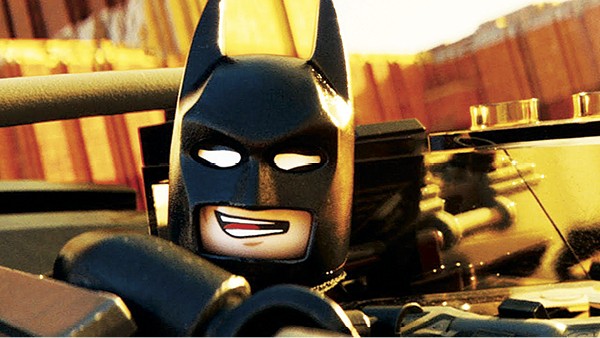
Will Arnett, The Lego Movie
Best Superhero
Will Arnett, The Lego Movie
Arnett doesn’t seem like the kind of guy who’s thought much about the cinematic legacy of Gotham City’s most famous crime fighter. And that indifference, combined with his unflappable and unfounded arrogance, makes him the perfect choice to play Batman. Arnett dismantles the Dark Knight myth and redefines the Caped Crusader as a pompous, smug, smoky-voiced egomaniac who saves the world with deadly seriousness when he’s not composing awful industrial music. Maybe Tim Burton and Adam West were right to play this whole comic-book hero thing as a big joke after all. — AE
MVP
Scarlett Johansson
This year, Johansson starred or co-starred in four films: Spike Jonze’s Her, Anthony and Joe Russo’s Captain America: The Winter Soldier, Jonathan Glazer’s Under the Skin, and Luc Besson’s Lucy. She transformed a quartet of roles that sounded like little more than male sex fantasies into rich, complicated character studies that raised important issues about the representation of women in cinema. Even Johansson’s haunting nude scene in Under the Skin probably confounded horndogs who had no idea what they were getting into. — AE
Inspired Madman
Alejandro Jodorowsky
The 85-year-old avant-garde director of El Topo and The Holy Mountain had a long-overdue revival in 2014. First, the documentary Jodorowsky’s Dune delved into the story of the greatest unmade movie in history, the 14-hour, universe spanning sci-fi epic Jodorowsky spent years and millions of dollars trying to make in the 1970s, destroying his career in the process. Then, he finally got to make another movie, The Dance of Reality, the punishing, insane, moving autobiography that proved he’s still got it, whatever “it” is. — CM
Most Pleasant Sound of Art Choking on Money
Guardians of the Galaxy
In its competition for most popular blockbuster, Guardians of the Galaxy shows the deficiencies that exist even when multimillion dollar franchises are made with sensitivity. James Gunn has made idiosyncratic and personal films, starting at Troma with the horror comedy Slither, and getting one of Ellen Page’s best performances in Super. Guardians of the Galaxy feels like a Gunn film until the CGI crap starts flying around in Marvel’s Third Act. Marvel hires good directors to give their blockbusters personality, but good films need resolution, not just preordained spectacle. The departure of Edgar Wright from Ant-Man is a sign of which side will win out. — BS
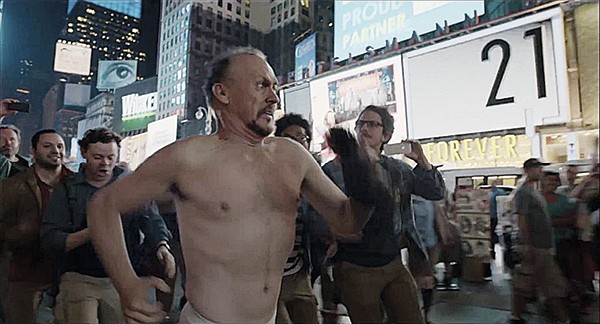
Birdman
More Like This, Please
Birdman
Birdman is an uneven mess of a movie, but it’s glorious in its audacity. When director Alejandro González Iñárritu is on, he’s really on. It combines black backstage comedy — anchored by a brilliant comeback performance by Michael Keaton and fine supporting turns from Zach Galifianakis, Edward Norton and Emma Stone—with formal experimentation by one of the great cinematic craftsmen of our time, cinematographer Emmanuel Lubezki. In a time of Hollywood conservatism, it’s great to see a group of talented artists pull out all the stops and succeed so fully. A great film like Birdman should be a wakeup call to producers about all of the wasted potential out there.
— CM
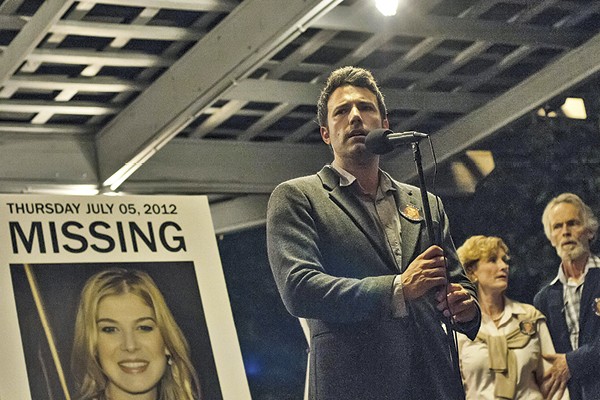
Gone Girl
Sex Negative
Gone Girl
David Fincher’s Gone Girl is another fun example of mass pop done right, and what that lacks. The film has two unlikeable people who find a perverse life together in a marriage based on elaborate media performances. The much more interesting one’s psychotic version of femininity is less like an actual person and more like a nemesis for misogynists. Writer Gillian Flynn and actress Rosamund Pike’s Amy was force-fed the “Cool Girl” ideal since birth, and she turns the trope into a supervillain persona. Fincher and Flynn’s misanthropy enriches what they create, more so than most studio products. But in loving that product you accept, also initially with irony, that socialized ideas of “man” and “woman” doom us and don’t change with passing generations. — BS
Best Documentary
Finding Vivian Maier
Equal parts detective story, character study, and artistic essay, directors John Maloof and Charlie Siskel’s documentary deserves all of the acclaim it has accrued on the festival circuit. Its absent protagonist, the eccentric nanny who took more than 100,000 photographs in her lifetime but never showed them to anyone, is slowly revealed through sometimes prickly interviews and Maier’s own, often incredible, work. It is also an oblique tribute to the power of the internet; had Maier lived today, she would have been a Flickr star instead of dying in obscurity, and the film about her life would be most widely seen on streaming services. — CM
Best Directors
Phil Lord and Christopher Miller
These guys are master pop-culture restoration artists: hand them a property with no commercial prospects and watch them twist and hammer it into filigreed comedy gold. Since 2009’s Cloudy with a Chance of Meatballs introduced their blend of snappy wordplay, children’s-show imagery, and hyperactive meta-textuality, Lord and Miller have been on a hot streak with few modern antecedents. American cinema hasn’t seen anyone release two comedies as rich and funny as The Lego Movie and 22 Jump Street in one year since Mel Brooks whipped out Blazing Saddles and Young Frankenstein in February and December of 1974. Lord and Miller’s work already looks snazzier than Brooks’; time will tell how well their jokes hold up. — AE
Richard Linklater
Patient observation is Linklater’s greatest virtue, and it paid off big time in Boyhood. Shot over the course of 12 years, the film follows the slow maturation of its lead character Mason in “real time” as the actor Ellar Coltrane grew up, and shows the same for Ethan Hawke, Patricia Arquette, and Lorelei Linklater. This is indie filmmaking on a epic scale, turning the drama, tragedy, and comedy of everyday life into art. Linklater’s achievement is that he kept it all together over the course of more than a decade and came out the other end with a coherent, beautiful, emotionally resonant masterpiece.
— CM
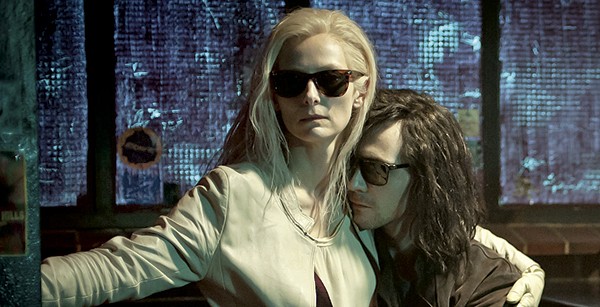
Only Lovers Left Alive
Best Pictures
Only Lovers Left Alive
Most romances roll credits right after the lead couple finally gets together. Fortunately, writer-director Jim Jarmusch approaches genre conventions differently. His supernatural love story begins way, way, waaaaaaaaaay after his star-crossed lovers (Tilda Swinton and Tom Hiddleston) first meet, and as he charts the ups and downs of their countless vampire weekends, he delivers the year’s most thoughtful and literate love story. Julian Barnes’ 1989 novel A History of the World in 10 ½ Chapters closes with a first-person monologue about what it’s like to be granted eternal life. Eventually, the storyteller chooses to die; after all, he’s slept with every famous person ever and he shoots an 18 whenever he plays golf. Thanks to the numerous large- and small-scale celebrations of human achievement, Jarmusch scatters throughout his film, it’s impossible to imagine his characters choosing the same. — AE
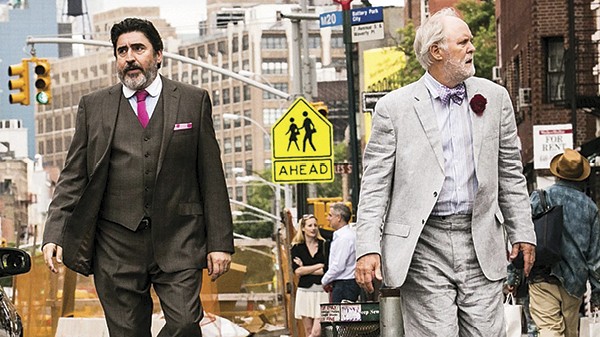
Love Is Strange
Love Is Strange
I saw a lot of movies in 2014, from tiny indies that cost $1,000 to giant, world-destroying blockbusters. But when I thought back on the year, none of them could touch the feeling I got sitting in the theater watching Love Is Strange for the first time. Or the second time, for that matter. Everything came together for Memphis-born director Ira Sachs’ ode to eternal love: career-high performances from John Lithgow, Alfred Molina, and Marisa Tomei; pristine cinematography that made New York City look like a grimy fairy land, perfect pacing, and a screenplay that made simplicity a virtue. Utter perfection that proves indie film is still alive, and Sachs is among its greatest practitioners.
— CM
Movie Of The Year
The Interview
Is Seth Rogen and James Franco’s buddy comedy about assassinating Kim Jong-un any good? Who knows? But the story of its demise seemed to sum up the world of 2014: The power-mad, petty dictator confirms stereotypes by ordering a cyber-hit on Sony; ugly secrets dragged out into the open to destroy the powerful; short-sighted corporate cowardice and incompetence in the face of unprecedented challenge; the blurring of lines between nation states and multi-national corporations; the conversation about the thing becoming more important than the thing itself, and the powerlessness of the artists caught in the middle. Think about it: a globe-spanning cyberwar sparked by a stupid buddy movie aimed at stoners. Who said cinema doesn’t matter any more? — CM